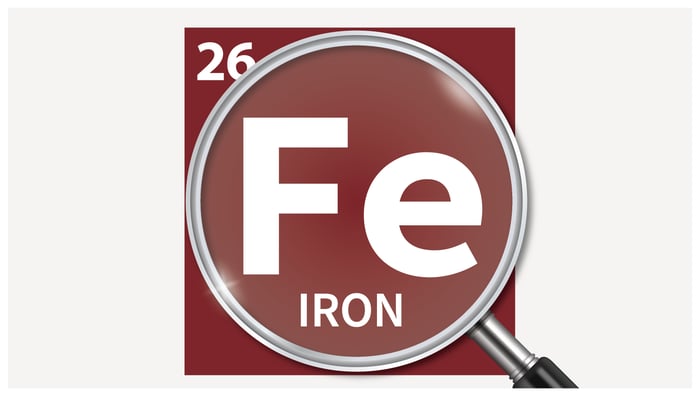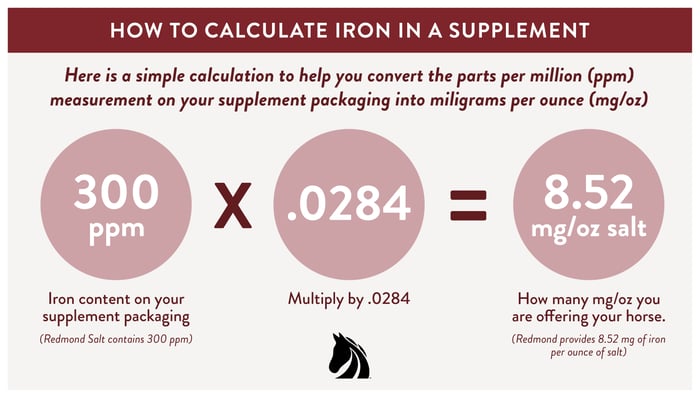How Much Iron Is in Redmond Equine Products?
July 28, 2023
How Much Iron Is in Redmond Equine Products?
"How much iron is in my supplement?"
It's a question we hear often from customers. Iron overload is frequently mentioned in the equine world when discussing supplements and feed. So, it's understandable the topic may prompt some concern in owners offering trace mineral supplements to their horses.
We want you to feel informed, comfortable, and confident feeding Redmond. So let's talk about iron! We'll cover why it's important, how much iron horses need (and actually consume) daily, and why you shouldn't be worried about the amounts in Redmond supplements.

Importance of Iron and Other Trace Minerals for Horses
When it comes to equine nutrition, the significance of trace minerals can't be overstated. Though required in small quantities, these essential minerals are indispensable to the well-being of horses. The University of Minnesota notes important trace minerals horses need include:
- Iron (Fe)
- Zinc (Zn)
- Copper (Cu)
- Selenium (Se)
- Manganese (Mn)
- Iodine (I)
- Cobalt (Co)
Trace minerals are naturally found in water, soil, rocks, and plants. They’re vital in a horse's diet and play a key role in maintaining body structure, electrolyte balance, nerve conduction, muscle contraction, and other bodily functions.
One trace mineral, iron, holds particular prominence. According to the Minerals Education Coalition, it ranks as the fourth most abundant element in Earth’s crust.
For horses, iron takes center stage in the production of hemoglobin, an essential protein in red blood cells that carries oxygen from the lungs to muscles and tissues throughout their bodies. Iron also contributes to the synthesis of myoglobin, a protein within muscle cells responsible for storing and delivering oxygen. Without iron, horses will become anemic, potentially compromising health and performance.
How Much Iron Do Horses Need?
Understanding how much iron horses need is an important part of equine care. Let's break down the numbers looking at feed requirements for an average-sized horse.
- Daily Iron Requirement: The National Research Council (NRC) notes a mature horse should receive 40 to 50 ppm (parts per million) of iron daily. Converting to milligrams, an average-sized horse's iron requirement is approximately 600 milligrams per day, with the range falling between 500 to 1,200 milligrams.
- Daily Feed Requirement: The NRC recommends horses consume 2% of their body weight in forage each day. That means an average 1,300-pound horse should eat around 12 kilograms (26 pounds) of feed daily.
- Amount of Iron in Feed: A peer-reviewed study that sampled forages commonly given to horses showed most contain approximately 250 milligrams of iron per kilogram of feed. Doing the calculation, 12 kilograms (26 pounds) of feed provided to the average horse contains approximately 3,000 milligrams of iron.
Now, 3,000 milligrams is well over the daily iron amount the NRC recommends for horses. And yet it is also following the NRC's recommended daily forage requirement. So which of the Council's recommendations is right—the amount of feed a horse should consume or the amount of iron a horse needs daily?
This kind of variation in the literature is normal. Committee researchers at the NRC are from universities across the United States and review piles of data to establish the values they suggest. Notice that word suggest. The NRC makes suggestions or recommendations rather than rigid mandates because of the variation of results in studies from which they draw.
Given the data, we can safely conclude that horses naturally consume high quantities of iron in feed, and overload typically occurs when we stray from normal and natural horse nutrition practices.
How Much Iron is in Redmond Equine Products?
Because Redmond Rock salt has a distinctive reddish-pink hue, some assume it also has high iron content. The stated values on product packaging may also add to this perception. For example, maybe you’ve seen the Redmond Rock Crushed label stating it contains 300 ppm of iron. Does that number cause concern that your horse is getting too much? It shouldn't! Let's clear up the confusion.
Redmond salt has iron levels of 300 ppm (mg/kg), meaning there are 300 milligrams of iron for every kilogram of salt consumed. However, unlike eating 12 kilograms (26 pounds) of forage, as we mentioned above, horses are only consuming 2 ounces of Redmond Rock Crushed. Let's understand the true iron content in this smaller serving size of Redmond mineral products.
 Redmond Rock/Crushed/Daily Red
Redmond Rock/Crushed/Daily Red
A one- to two-ounce serving of Redmond Rock, Crushed, or Daily Red salt provides around 300-600 ppm of iron. Doing the calculations in the graphic above, that's 8.52-17.04 milligrams. Far below the 500-milligram daily minimum a horse needs. (Find the complete Redmond Rock mineral analysis here.)
When you consider the abundant quantity of iron horses receive from recommended forage rations, the amounts in Redmond products is very small. To put it in context, the iron content in Redmond mineral salt is less than 3% of the suggested allowance and not even 1% of actual iron intake.
Daily Gold Stress Relief
A 2-ounce serving of Daily Gold bentonite clay provides around 3,900 ppm, or 110.76 milligrams of iron per day. (Find the complete Daily Gold mineral analysis here.) That is approximately 18% of the suggested allowance and only 3.6% of the actual iron intake of horses.
Navigating the Complex Web of Minerals
What we know when it comes to mineral requirements is they are not an exact science and the mineral interaction web is extremely complex. Minerals do not act alone.
For instance, research suggests iron maintains a close relationship with zinc, copper, and manganese. It's likely to conclude that iron levels alone don't usually cause problems for horses as much as an imbalance of a group of minerals. In short, iron needs to be balanced with other minerals to maintain good health.
Achieve Mineral Balance with Redmond
At Redmond, we take pride in bringing horses quality mineral products. Every salt and bentonite supplement is mined from an ancient deposit in Utah, USA, and contains 60+ bioavailable and naturally balanced trace minerals. Rest assured the full spectrum of minerals in Redmond products come in the formula nature intended and work in harmony to nourish horses. Click below to learn more about and purchase natural Redmond horse products.
Learn More
- Curious where Redmond Rock comes from? Explore our mine and find out!
- Sepaking of minerals, find out why horses need selenium and how to supplement it.
© Redmond Equine 2023. All rights reserved.
Related posts
.jpg)
Iron for Horses: How Much is Too Much?
Iron is an essential trace mineral for horses. Iron overload or toxicity in horses is also a serious condition. So how much iron is too much for...
December 18, 2024

Redmond Daily Duo: Foundational Horse Mineral Supplements
Choosing the right minerals for your horse is vital. Redmond keeps it simple with two core mineral supplements that support horse gut health and...



